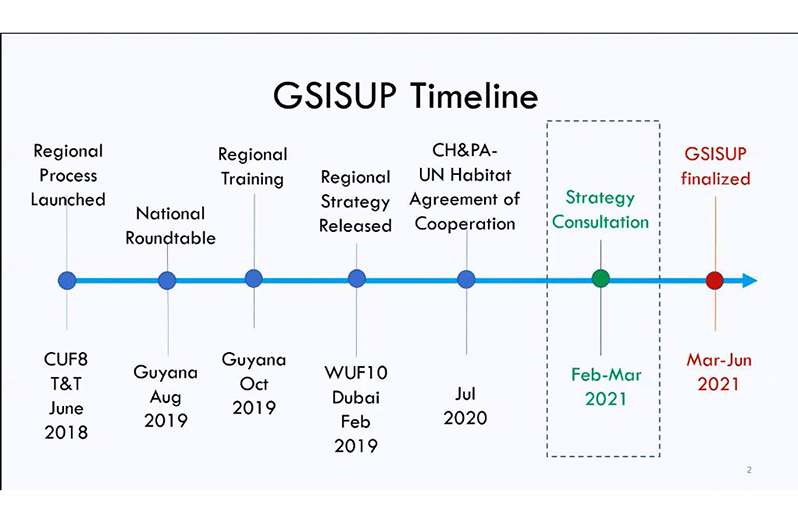THE Central Housing and Planning Authority (CH&PA), on Thursday, launched a “Guyana Strategy for Informal Settlements Upgrading and Prevention” (GSISUP), a collaborative multi-stakeholder programme that seeks to develop a national strategy to address and eventually eliminate squatting here.
According to statistics compiled by the CH&PA, some 15 per cent of the Guyanese population, the equivalent of just over 110,000 persons, are living in informal settlement communities, while another over 27,500 households are known to be residing on State lands in 231 informal settlement communities.
“Informal settlements have been a challenge,” CH&PA Chief Executive Officer (CEO) Sherwyn Greaves said during the launch on Thursday.
He said that the CH&PA is currently dealing with issues at a number of squatter settlements that at times prevent the Authority from carrying out its mandate of developing communities across the country.
“At CH&PA, we hope to deal with it in a manner that there is a win-win situation for all, and does not go down the road that causes anarchy in some areas,” he said, adding: “We want to address this as quickly as possible, and look forward to all of us working together to resolve this.”
Greaves emphasised that in order for the CH&PA to properly deal with the situation, it must first embark on a data-gathering process to get a holistic view of squatter settlements in Guyana, by understanding how widespread it is, as well as the reasons that drive the squatting situation.
“We cannot manage what we don’t know,” he said, adding: “So we have to know the numbers, and to know the why; why people go this route of squatting? This will help us decide whether we regularise or relocate. All the input will form part of the final strategy, which we will use going forward, and educate us to come to amicable solutions with persons.”
The GSISUP programme is an initiative that comes under the United Nations Human Settlements Programme (UN-Habitat), and is part of the third cycle of a tripartite partnership programme, the Participatory Slum Upgrading Programme (PSUP).
PSUP is directly linked to the UN’s Sustainable Development Goal 11 Target 1, which seeks to “ensure access for all to adequate, safe and affordable housing and basic services and upgrade slums by 2030”. The programme seeks to transform slum areas for a better urban future.
The PSUP has facilitated the development of the Caribbean Strategy for Informal Settlements Upgrading (CSISU), of which GSISUP is a part.
GSISUP aims to develop a set of strategic priorities and actionable policy proposals that will address issues surrounding informal settlements in Guyana, and facilitate settlement regularisation, or relocation from zero-tolerance areas, as well as to reduce the likelihood of future informal settlement development.
Guyana is one of five Caribbean nations where PSUP is being implemented, with the overall programme being implemented in 40 countries. Aside from the Caribbean region, it is also being implemented in countries in Africa and the Pacific regions.
Founded in 2008, the PSUP is a tripartite initiative of the Secretariat of the Africa, Caribbean and Pacific Group of States (ACP), the European Commission, and UN-Habitat.
Also present at Thursday’s launch and delivering remarks were CH&PA Community Development Officer, Roxanne Campbell; UN-Habitat PSUP Regional Programme Advisor, Emrah Engindeniz; UN-Habitat Regional Representative for Latin America and the Caribbean, Elkin Velásquez; and Senior Informal Settlements Upgrading Expert, Michel Frojmovic.
Frojmovic will be working with the CH&PA and UN-Habitat, over the next few months to craft the strategy that will guide national policies. During his remarks, he emphasised the importance of ensuring all stakeholders are involved in the crafting of a national strategy. He stressed that consultations and data gathering are therefore critical aspects of the programme.
“We are at a critical stage of preparation of this strategy. Consultation will continue for a couple of months, in order to move to a formal strategy. Stakeholder engagement and participation are at the centre of the process,” Frojmovic said.




.png)









